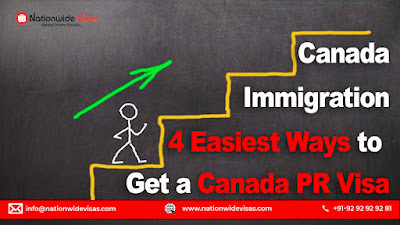Over 1.3 million additional immigrants will arrive in Canada between 2022 and 2024. There are several ways to immigrate to Canada and get a Canadian permanent residency.
A Canadian permanent resident is a foreign national who has been granted permanent status in Canada. Permanent residents in Canada have certain rights, such as access to healthcare and social services, the ability to live, work, and study anywhere in Canada, and legal protection under Canadian law. Furthermore, after a certain amount of time as a permanent resident, permanent residents have the right to apply for Canadian citizenship. Notably, permanent residents of Canada do not have the right to vote in Canadian elections. In contrast, a citizen has the right to vote in Canadian elections and can live, work, and study anywhere in Canada. Citizenship cannot also be withdrawn or deleted. In addition, everyone born in Canada is immediately granted Canadian citizenship.
 |
| Different Pathways to Canada Immigration and PR |
Canada's cities and rural communities rely on immigration to keep their populations increasing and their labor markets afloat. Canada similarly has an aging population, and without a robust immigration system, the country would be on a similar path as Japan in the 1990s. However, unlike Japan, Canada has welcomed immigration, which has helped us to keep a high proportion of the population in prime working age, between the ages of 25 and 54. It would not be conceivable without a large influx of Immigrate to Canada.
There are over 80 different methods to come to Canada. In order to make things easy for our readers, we have covered the basic categories of Canadian immigration. In addition, we have covered the prerequisites and qualifications for each program in the coming paras.
It is important to note that each immigration program has its own set of rules for minimum eligibility here. Therefore, it is critical to confirm your eligibility before applying.
The Canadian government will ask for several papers to verify your employment experience, education, identification, and criminal and medical history when you apply. The documentation required differs according to the program for which you are applying. To determine the paperwork you will require, you must first choose which immigration program is appropriate for you!
Any Canadian immigration scheme has no age limitations. However, candidates between the ages of 25 and 35 receive the most points in most economic immigration categories. This is not to argue that elderly applicants should not be considered. Significant employment experience, strong language fluency, Canadian contacts, and advanced education may offset any points lost owing to age in economic immigration.
Economic and Business Immigration Options
People with skills that assist the Canadian economy can apply for economic and commercial immigration. There is no one-size-fits-all definition because the requirements necessary for each program vary substantially. Provincial Nominee Programs, Express Entry, Quebec Immigration, Investor Programs, and Entrepreneur and Self-Employed Programs are among the economic and business immigration categories.
Other government immigration programs that come under the area of economic immigration to Canada include the Caregivers Program, the Atlantic Immigration Pilot, the Rural and Northern Immigration Pilot, and the Agri-Food Pilot.
Family Sponsorship
Family sponsorship is a sort of immigration through which family members of Canadian citizens and permanent residents are allowed to join the nation. Spouse or common-law/conjugal partner, dependent kid (adopted or biological), and parents and grandparents are all able to sponsor.
Other family members may be able to sponsor you if you fall outside of the above-mentioned categories. Assume you don't have any other qualifying relatives to sponsor. In that situation, you may sponsor an orphaned brother or sister, an orphaned nephew or niece, or an orphaned grandchild.
Family sponsorship and humanitarian and refugee immigration to Canada do not employ a ranking system and so have no age restrictions.
While some Canadian immigration programs require applicants to have a work offer in Canada, there are a variety of programs and choices accessible to foreign nationals who do not have a job offer in Canada. Here are two major immigration schemes that do not require a work offer from a Canadian employer:
Express Entry Program
Express Entry is the shortest way to become a permanent resident of Canada. The majority of Express Entry applications are handled in six months or less. Every year, about 100,000 immigrants are admitted to Canada using the Express Entry system. If you apply for an Express Entry program, you will almost certainly not need a job offer. According to the IRCC's Year-End Report 2019, over 90% of Express Entry candidates were requested to apply for permanent residency despite not having a job offer in Canada.
Candidates for Express Entry must have appropriate employment and educational experience, as well as fluency in a foreign language. You will not, however, lose points because you do not have an offer from a Canadian corporation.
Provincial Nominee Programs (PNPs)
There are also several Provincial Nominee Programs where you do not need a work offer to apply. For example, some provinces, such as Saskatchewan, will instead employ points-based Expressions of Interest (EOI) systems, similar to Express Entry, to select which applicants will be asked to file for nomination. As well, like Ontario and Nova Scotia, other provinces will directly invite individuals from the Express Entry pool to meet specific demographic or labor market shortages. That is, simply having an Express Entry profile in the pool of candidates increases your chances of being accepted to live permanently in a Canadian province.
So, if you wish to immigrate to Canada but don't know where to start, here we are. The Nationwide Visas team has years of experience dealing with Canada PR cases and applications.
So, why wait?
Book your free consultation today with one of our Canadian immigration experts and let us move you smoothly through the whole process with utmost ease and comfort.





